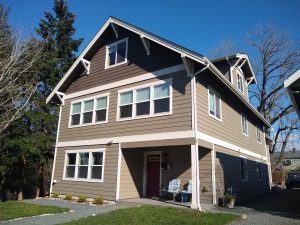The transition from addiction to lasting recovery involves various phases and one of the most crucial phases is the stay in a sober living home. Typically, the longer the duration in sober living can significantly benefit long-term sobriety.
SOBER LIVING HOMES PROVIDE A BRIDGE
Sober living homes provide a bridge between the highly structured environment of treatment centers and the autonomy of fully independent living. They should offer a safe, supportive, and substance-free living environment for individuals in recovery.
HOW LONG SHOULD SOMEONE STAY IN SOBER LIVING?
The duration of a person’s stay in a sober living home is influenced by several factors.
Individual Progress:
Each person’s progress varies on factors such as the severity of addiction, personal resilience, and willingness to change. Some make rapid strides in their recovery, while others require more time to address deep-seated issues and establish a stable foundation for lasting sobriety. The length of stay should be tailored to the individuals’ pace of progress, ensuring they are adequately equipped to transition successfully to independent living without compromising their sobriety.
Level of Support:
Social support is crucial in recovery. Those who have a strong network of family, friends, and a sponsor that understands and champions their journey may be able to transition to independent living more quickly. However, those without a robust support system could benefit from an extended stay in a sober living home. Our experience shows that people living in recovery housing with like-minded individuals and working toward a common goal, experience a much higher rate of success than those who return to their old environment. Especially, too soon.
Co-Occurring Disorders:
Some individuals dealing with addiction also have underlying mental health disorders, which can complicate the recovery process. Addressing these disorders requires specialized care and additional time in treatment. We can accommodate the unique needs of these individuals as long as they remain steadfast working with their support team.
Relapse History:
Multiple relapses are common and they often require an extended period of reinforcement and re-evaluation of their strategies for preventing relapse. A longer stay in sober living allows residents to revisit and refine their relapse prevention plans, identify triggers, and develop stronger coping mechanisms. Especially, in a safe environment with support of their housemates. This extra time increases the likelihood of breaking the cycle of relapse and paving the way for a more solid and lasting recovery.
Life Skills Development:
Recovery is not just about abstaining from substance abuse – it’s about acquiring essential life skills that enable the individual to lead fulfilling lives. Learning skills like conflict resolution, communication, basic chores, cooking, and job hunting are important for successful reintegration into society. A longer stay in a sober living home provides the opportunity to acquire and practice these skills under the guidance and support of the house leaders and their peers, reducing the risk of feeling overwhelmed when facing the challenges of independent living.
WHAT ARE THE BENEFITS OF A LONGER STAY IN SOBER LIVING?
Solidify New Habits:
Habits take time to form, and sobriety is a habit that requires constant reinforcement and refinement. A longer stay in sober living allows residents to internalize new behaviors and coping mechanisms, reducing the risk of relapse.
Rebuilding Confidence:
The process of addiction can erode an individual’s self-esteem and self-worth. Extended time in sober living provides a nurturing environment to rebuild confidence and self-belief.
Emotional Healing:
Recovery involves addressing not only the physical aspects of addiction but also the emotional scars. Individual journaling can help aid in the emotional healing process and a longer stay provides more time for emotional healing and growth.
Building Relationships:
Relationships within the sober living community plays a significant role in recovery. A longer stay fosters stronger connections with peers who share similar struggles and goals. We have seen this time and time again, witnessing long-lasting friendships in our recovery homes.
Stress-Free Transition:
Recovering addicts can be sensitive to changes. Rushing into independent living without adequate preparation is unwise and can lead to overwhelming stress, potentially triggering a relapse. An extended stay allows for a gradual transition and the development of effective coping strategies.
At Second WakeUp House and Redemption place there is no minimum stay requirement. We strongly recommend a minimum of six months due to the factors mentioned previously. In addition, there is also not a maximum stay requirement either. People are welcome to stay as long as they need (as long as they are following the rules and are working their recovery). We have witnessed those who are committed to staying and working their recovery, developing a longer-lasting recovery journey.
SOBER LIVING HOMES OFFER A CURCIAL STEPPING-STONE IN ONE’S RECOVERY JOURNEY.
The road to lasting sobriety is not a race but a journey that demands patience, commitment, and time. One day at a time. Sober living homes offer a crucial stepping-stone in this journey, providing individuals with space and support needed to solidify their recovery efforts. While the duration of stay varies based on individual circumstances, staying longer in a sober living home can greatly enhance the chances of achieving and maintaining long-term sobriety. By embracing the benefits of a longer stay, residents can lay the groundwork for a healthier, happier, and more fulfilling life free from the shackles of addiction.
Contact us to see if you or someone you know would be a good fit for our clean, sober living homes Second WakeUp House and Redemption Place.
Looking for more inspiration? Be sure to follow us on Instagram and Facebook.
